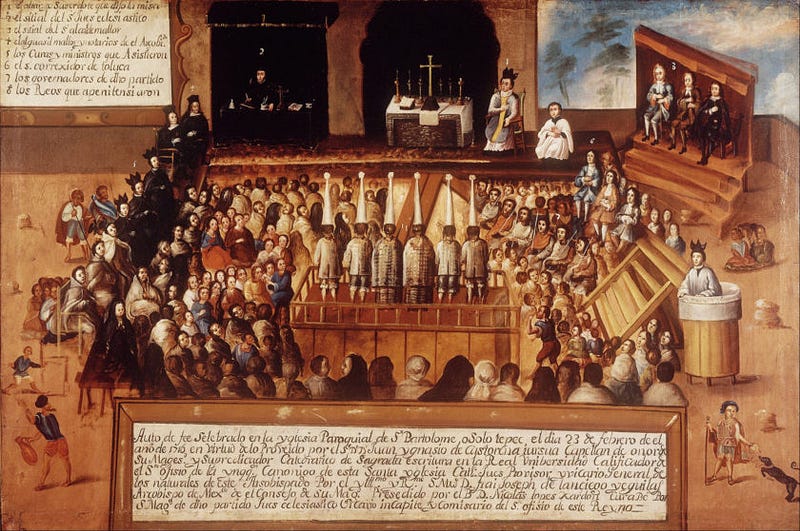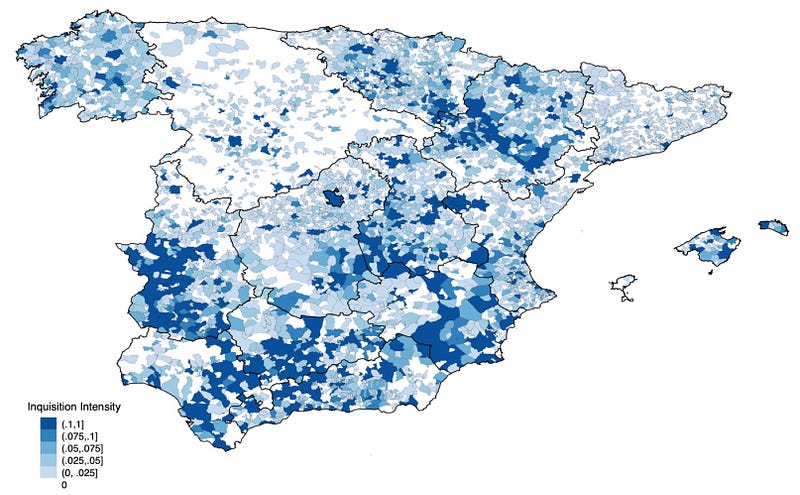The Unforeseen Legacy of the Spanish Inquisition in Modern Times
Written on
Chapter 1: The Historical Context
The title above is a nod to the famous Monty Python sketch that popularized the phrase, “Nobody expects the Spanish Inquisition!” However, this discussion will pivot away from comedy and focus on a recent academic study that delves into the enduring consequences of religious persecution.
The paper titled The Long-Run Effects of Religious Persecution: Evidence from the Spanish Inquisition, published on August 17, 2021, in the Proceedings of the National Academy of Sciences, poses a critical inquiry:
Can the ramifications of religious persecution persist long after its conclusion?
To investigate this, researchers analyzed data from the Spanish Inquisition to ascertain its effects on contemporary Spanish society.
Section 1.1: Methodology of the Study
The researchers began with a comprehensive dataset encompassing 67,000 trials conducted by the Spanish Inquisition from 1478 to 1834. They then integrated this historical data with modern surveys that assessed trust levels, socioeconomic status, income indicators, and educational attainment.
Subsection 1.1.1: Key Findings
The study revealed that regions where the Inquisition was more active today experience significantly lower economic activity, diminished trust, and reduced educational levels. Interestingly, religiosity remains elevated in these areas.
But does this correlation imply that these regions were already disadvantaged in terms of wealth or education?
The researchers addressed this by demonstrating that the Inquisition did not primarily target poorer or more religious communities. Their findings suggest that the Spanish Inquisition left specific, lasting impacts that resonate into the present.

Chapter 2: Understanding the Spanish Inquisition
Established in 1478, the Spanish Inquisition aimed to root out heresy as defined by the Catholic Church. Over its 356-year reign, it persecuted tens of thousands, employing brutal methods to extract confessions, often resulting in horrific punishments.
The Inquisition targeted a wide array of perceived "crimes," including crypto-Judaism, Lutheranism, blasphemy, and witchcraft, affecting all societal tiers, from peasants to monarchs. Notably, clergy and women comprised a significant portion of those tried.
For further insights, you can explore the Wikipedia page on the Spanish Inquisition.
This reaction video features Americans watching Monty Python's comedic take on the Spanish Inquisition, highlighting the absurdity of the persecution.
Section 2.1: The Climate of Fear
The Inquisition wielded substantial influence through fear rather than constant violence. Its presence created an atmosphere of terror, discouraging dissent and stifling intellectual discourse.
Section 2.2: Geographic Disparities in Impact
The extent of persecution varied across Spain, with some regions facing intense scrutiny while others were largely unaffected. A map included in the study illustrates these disparities, indicating that southern tribunals experienced heightened persecution levels.

Chapter 3: The Contemporary Repercussions
The Inquisition's particular focus on educated and prosperous citizens deeply affected Spain's cultural and intellectual landscape. By prohibiting the printing of certain books and targeting the middle class, it disincentivized education and independent thought.
Surprisingly, present-day areas that witnessed greater persecution are notably poorer, more religious, and less trusting. This correlation underscores the long-term social ramifications of such historical traumas, as high local conflict and low trust perpetuate negative outcomes across generations.
Section 3.1: Global Implications
While this study concentrates on Spain, the Inquisition's reach extended to Southern Italy and throughout the Spanish Empire. Similar patterns of low education, income, and trust may persist in these regions, potentially impacting millions.
To conclude, while we may not expect to see the effects of the Spanish Inquisition in our modern world, its influence is undeniably felt even today.
In this video, Americans react to Monty Python's skit about the Spanish Inquisition, revealing insights into cultural perceptions of this historical event.